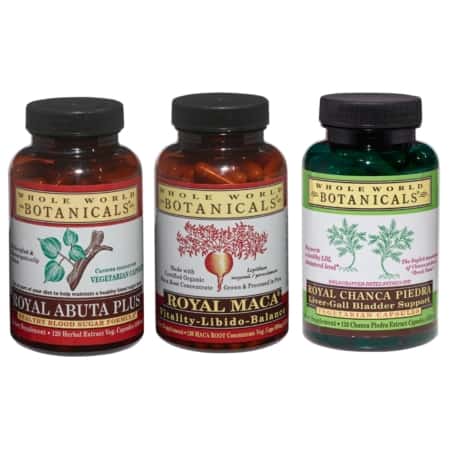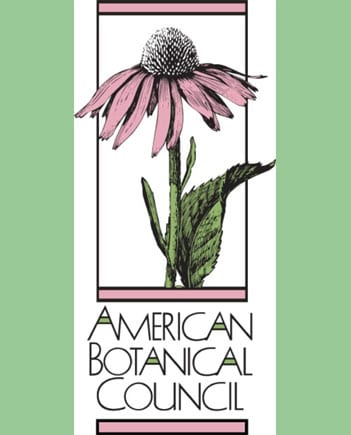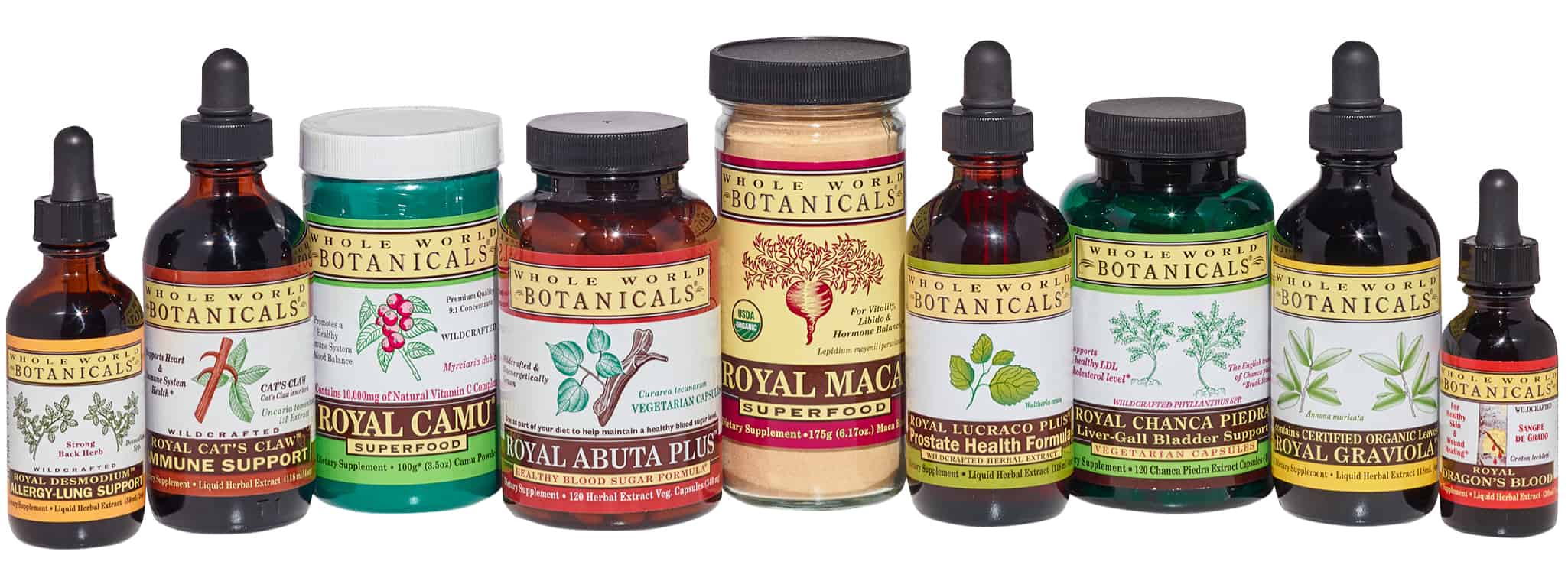Abuta: A Botanical Breakthrough for High Blood Sugar
Viana Muller, PhD
It’s a situation that millions of us experience every year. You’re sitting with your doctor, reviewing the results of your annual bloodwork, when the doctor looks at you with concern and says, “Hmmm, your blood sugar levels look a bit high. You need to cut way back on the sugar.”
Americans do have high rates of sugar consumption, but it’s only part of the story. Overeating in general – and in particular, eating a diet high in carbohydrates – also dramatically raises blood sugar levels. And, after years of a high-calorie, high-carbohydrate diet, many of us have underlying pancreatic dysfunction and insulin resistance. As a result, we have become incredibly efficient at storing excess glucose in the bloodstream as fat – and ineffective at burning it off! The result is that almost 40% of Americans are walking around with high blood sugar and its consequences, including increased belly fat, uncontrolled weight gain, and disease-promoting inflammation. In many cases, this leads to prediabetes – a condition where fasting blood sugar levels are consistently between 100 and 120. Untreated, prediabetes often leads to type 2 diabetes, with blood sugar levels consistently above 120.
The Role of Type 2 Diabetes Medications
Apart from the recommendation to avoid sugar, the conventional medical approach to high blood sugar is usually to prescribe medications to help increase insulin production, or make you more sensitive to insulin, including the most commonly prescribed type 2 diabetes drug, metformin (Glucophage.)
 But this raises two problems. First, these medications are only truly effective in combination with significant dietary changes. And let’s be realistic: many people are unwilling or unable to change their diet. Second, even with some dietary changes, medications still don’t work well enough for everyone. So, even with medication, millions of Americans still have disturbingly high blood sugar levels and are well on the way to diabetes – if not already there!
But this raises two problems. First, these medications are only truly effective in combination with significant dietary changes. And let’s be realistic: many people are unwilling or unable to change their diet. Second, even with some dietary changes, medications still don’t work well enough for everyone. So, even with medication, millions of Americans still have disturbingly high blood sugar levels and are well on the way to diabetes – if not already there!
If you’re insulin resistant, or you’re being treated for high blood sugar levels, is there a natural way to eat a modest to moderate amount of carbs and sugary foods and still maintain healthier blood sugar levels?
Stalking the Wild Abuta!
When I first co-founded the company, I knew it would be a major help for people if we could find a dramatically effective medicinal plant that could help maintain a healthy blood sugar level. Soon afterward, I asked Hugo Malaspina, MD, a noted Peruvian natural health practitioner, if any traditional Peruvian botanicals could effectively lower high blood sugar. He named two different botanicals he used with his patients. But he added a caveat. “When neither of them is effective in bringing down a patient’s blood sugar level, I use Abuta – it always works. But it’s much harder to find.“
Of course, I did not want to settle for the plants that usually worked pretty well. I wanted the “grand prize!” But finding the specific type of Abuta Dr. Malaspina recommended was a challenge. It turns out that the Peruvian rainforest has many different plant species called Abuta that are traditionally used to manage blood sugar. Armed with samples, I was able to connect with a botanical taxonomist at the New York Botanical Garden who was knowledgeable about the plants of the Upper (Peruvian) Amazon. He identified the elusive species as Curarea tecunarum. Fortunately, we were already working with a Peruvian parabotanist who was an expert in the native therapeutic plants of the Upper Amazon, and he knew where to find this particular kind of Abuta.
That began our mission to formulate Royal Abuta Plus™, a therapeutic-grade botanical formula that promotes blood sugar balance.  Royal Abuta Plus™ includes not only the potent Curarea tecunarum form of Abuta but two other Peruvian botanicals that have blood sugar-regulating effects. Specifically, we added Lemon Grass (Cymbopogon citratus) from the Amazon rainforest and Pasuchaca (Germanium delsianum), a mountain herb that grows in the Peruvian Andes. Scientific literature suggests that both Lemon Grass and Pasuchaca have blood sugar-regulating properties. But despite the verified successful clinical use of Curarea tecunarum and the thousands of years of traditional use of this botanical to promote a healthy blood sugar level, we found no published studies on its use for this purpose.
Royal Abuta Plus™ includes not only the potent Curarea tecunarum form of Abuta but two other Peruvian botanicals that have blood sugar-regulating effects. Specifically, we added Lemon Grass (Cymbopogon citratus) from the Amazon rainforest and Pasuchaca (Germanium delsianum), a mountain herb that grows in the Peruvian Andes. Scientific literature suggests that both Lemon Grass and Pasuchaca have blood sugar-regulating properties. But despite the verified successful clinical use of Curarea tecunarum and the thousands of years of traditional use of this botanical to promote a healthy blood sugar level, we found no published studies on its use for this purpose.
A Study of Royal Abuta Plus™
So, in 2001, Whole World Botanicals sponsored a clinical study. For our trial of Royal Abuta Plus™ we chose 19 participants with type 2 diabetes who had out-of-control fasting blood sugar levels that ranged from 160 to 260, even though they were all taking prescription medication to treat their diabetes. The participants were all highly motivated, as in Peru, doctors do not typically prescribe insulin for patients with type 2 diabetes.
During the study, the participants continued taking their medication as usual and added one capsule of the Royal Abuta Plus™ twice daily, with breakfast and with lunch, which in Peru is the biggest meal of the day. The participants were explicitly asked not to change or improve their regular diet, which was heavy on white rice, potatoes, fried foods, and refined white sugar. We wanted the study to measure the effect of the botanical, not the benefits of an improved diet!
After the eight-week study, the people taking the Royal Abuta Plus™ capsules had, without a change in diet, a reduction in blood sugar levels ranging from 100 to 160 points, with all of them returning to a fasting blood sugar level of under 120! Those taking the placebo pills remained at elevated blood sugar levels throughout the study. The Peruvian naturopathic doctor and plant pharmacologist who participated in the design of our study said they’d never seen such dramatic results! It became apparent that, in some way, Abuta was supporting the health of the pancreas, as the participants in this study were consuming a diet heavy in carbohydrates and sugar and their fasting blood sugar levels dropped down into the normal range as early as six weeks into the study.
What We’re Hearing About Royal Abuta Plus™
Our study – and two decades of customer feedback – have shown that people taking Royal Abuta Plus™ can improve and better control their blood sugar levels even when they continue to eat a high-glycemic diet!
We have also heard anecdotal reports from many of our customers who are taking medication for elevated blood sugar levels – sometimes above 200 – and were able to lower their blood sugar significantly when they added twice daily doses of Royal Abuta Plus™. Equally important, over time, it’s reducing their sugar cravings!
An early fan of Royal Abuta Plus™ – a chiropractor from northern California – shared his story:
“I purchased this product for my mother, whose blood sugar level hasn’t been well controlled by just using metformin. But her diet has not been exemplary. Now she can eat her daily cookie and maintain a healthy blood sugar level!”
Here’s a recent and very gratifying success story I recently received:
“My father has been using Royal Abuta Plus™ from Whole World Botanicals, two capsules twice a day, for over a year, along with metformin. Before he started taking it, his glucose was averaging in the mid-200s each morning before breakfast. Now that he is using the Royal Abuta Plus™, it is averaging in the mid-100s!”
Should You Start Royal Abuta Plus™?
Could Royal Abuta Plus be beneficial to you? Yes, if you face one of the following challenges:
- You have “high normal“ blood sugar levels and want to support your pancreatic function and lower your blood sugar level, but you find it difficult – or downright impossible – to maintain a low-carbohydrate, low-sugar diet for any length of time.
- You are prediabetic or borderline diabetic and are looking for a way to reduce your cravings for sugar and carbohydrates and lower your AIC level.
- You have been diagnosed with type 2 diabetes and are taking medication, but your blood sugar levels are still out-of-control.
We recommend starting with one capsule of Royal Abuta Plus™ with breakfast and again with dinner. You can also try taking 2 capsules, twice a day with food. Your response to the botanical should guide your dosage of Royal Abuta Plus™. You may also want to use fingerstick blood glucose testing to guide you as you increase your dose. You should allow about six weeks to see the full effects.
A word of caution: Royal Abuta Plus™ is not meant to replace medication, and this botanical doesn’t prevent, treat, or cure diabetes. Royal Abuta Plus™ is, however, the perfect natural complement to your existing treatment. By supporting your pancreatic function, it could be the key to curbing your carb and sugar cravings, and balancing your blood sugar – without following a severely carbohydrate-restricted diet. (Note: Royal Abuta Plus™ is not, however, recommended for people with insulin-dependent or brittle diabetes.)
You Can Have Better Blood Sugar Balance!
While a healthy diet and medication are important, it’s clear that our Royal Abuta Plus™ can play a vital role as well.
Citations
Chang, A., Klinar, S., Malaspina, H., Ramos, B., Muller, V. “Evaluación de la actividad hipoglicemiante de Curarea tecunarum Bameby & Krukoff ‘Abuta.'” Fitoica: Revista Científica del Laboratorio de Productos Naturales. Año 2 . Num. Especial – 2007
(Evaluation of the Hypoglycemic Activity Curarea Tecunarum Bameby & Krukoff ‘Abuta.'” Fitoica: Scientific Review from the Natural Products Laboratory.)
http://bibliotecafarmaceutica.com/Fitoica/2007/5.pdf
Aranda-Ventura J, Villacrés J, Mego R, Delgado H. Efecto de los extractos de Geranium ayavacense W. (Pasuchaca) sobre la glicemia en ratas con diabetes mellitus experimental [Effect of extracts of Geranium ayavacense W. (Pasuchaca) on glycemia on rats with experimental diabetes mellitus]. Rev Peru Med Exp Salud Publica. 2014 Apr;31(2):261-6. Spanish. PMID: 25123863.
https://pubmed.ncbi.nlm.nih.gov/25123863/
Garba, H.A., Mohammed, A., Ibrahim, M.A. et al. Effect of lemongrass (Cymbopogon citratus Stapf) tea in a type 2 diabetes rat model. Clin Phytosci 6, 19 (2020).
https://link.springer.com/article/10.1186/s40816-020-00167-y


























